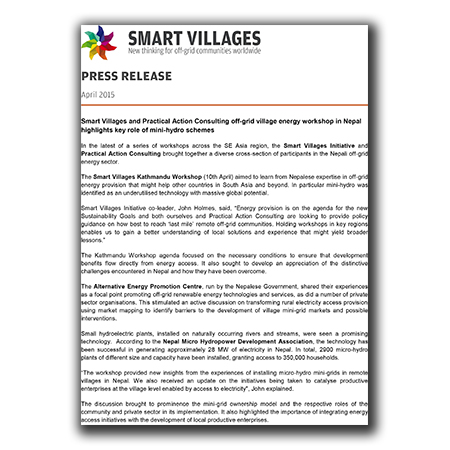Smart Villages and Practical Action Consulting off-grid village energy workshop in Nepal highlights key role of mini-hydro schemes
In the latest of a series of workshops across the SE Asia region, the Smart Villages Initiative and Practical Action Consulting brought together a diverse cross-section of participants in the Nepali off-grid energy sector.
The Smart Villages Kathmandu Workshop (10th April) aimed to learn from Nepalese expertise in off-grid energy provision that might help other countries in South Asia and beyond. In particular mini-hydro was identified as an underutilised technology with massive global potential.
Smart Villages Initiative co-leader, John Holmes, said, “Energy provision is on the agenda for the new Sustainability Goals and both ourselves and Practical Action Consulting are looking to provide policy guidance on how best to reach ‘last mile’ remote off-grid communities. Holding workshops in key regions enables us to gain a better understanding of local solutions and experience that might yield broader lessons.”
The Kathmandu Workshop agenda focused on the necessary conditions to ensure that development benefits flow directly from energy access. It also sought to develop an appreciation of the distinctive challenges encountered in Nepal and how they have been overcome.
The Alternative Energy Promotion Centre, run by the Nepalese Government, shared their experiences as a focal point promoting off-grid renewable energy technologies and services, as did a number of private sector organisations. This stimulated an active discussion on transforming rural electricity access provision using market mapping to identify barriers to the development of village mini-grid markets and possible interventions.
Small hydroelectric plants, installed on naturally occurring rivers and streams, were seen a promising technology. According to the Nepal Micro Hydropower Development Association, the technology has been successful in generating approximately 28 MW of electricity in Nepal. In total, 2900 micro-hydro plants of different size and capacity have been installed, granting access to 350,000 households.
“The workshop provided new insights from the experiences of installing micro-hydro mini-grids in remote villages in Nepal. We also received an update on the initiatives being taken to catalyse productive enterprises at the village level enabled by access to electricity”, John explained.
The discussion brought to prominence the mini-grid ownership model and the respective roles of the community and private sector in its implementation. It also highlighted the importance of integrating energy access initiatives with the development of local productive enterprises.
Ensuring that electricity access acts as a truly transformative influence on people’s livelihoods is important. Participatory Market System Development, formulated by Practical Action Consulting, was proposed as a tool to identify barriers to the development of markets able to produce high-value energy enabled goods and services. This approach has implications for the future of the 1.3 billion people worldwide who lack access to electricity.
More details on the workshop and supplementary material can be found at here.









